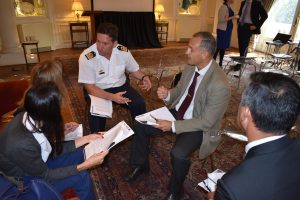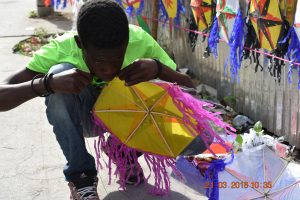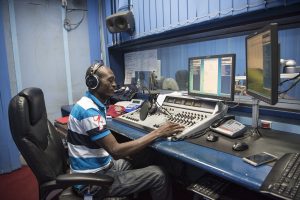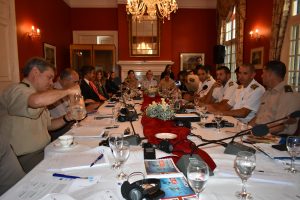Field Research and Work
Field research and work provides an evidence base for the project, and opportunities to trial, test, adapt and implement the toolkit. Reports have been or are being produced about findings from some of those trips, and the research has been used together with desk research on law, human rights, gender, and political science in order to provide robust, evidence-based solutions. The following are some examples of the types of research conducted in the field.
Argentina: In March 2018 the project team held a child safeguarding workshop Buenos Aires, Argentina with the central aim of exploring TCCs’ best practices and ways for them further to improve safeguarding children from sexual exploitation and abuse in UN peacekeeping operations. The TCC perspective is crucial for understanding how to implement child safeguarding on the ground in peacekeeping operations. Argentina is one of more than 120 countries working with the United Nations to help keep the peace around the globe. It is a major troop-contributing country that is widely lauded for the professionalism of its soldiers, the role it plays in the protection of civilians, and its levels of deployment to some of the worst conflicts in the world.

Brazil: In December 2016 a child safeguarding workshop was held in Brasilia, Brazil with the central aim of exploring TCCs’ best practices and ways for them further to improve safeguarding children from sexual exploitation and abuse in UN peacekeeping operations. The TCC perspective is crucial for understanding how to implement child safeguarding on the ground in peacekeeping operations. Bringing together government and military actors from Brazil and the UK, together with UN staff, enabled early exploration of good practice and gaps to be addressed. KCS Report Brazil
Ghana: In May 2017 the project team ran a workshop in Accra, Ghana at the Kofi Annan Peacekeeping Training Centre. The central aim was to explore PTCs’ best practices and ways for them further to improve safeguarding children from sexual exploitation and abuse in UN peacekeeping operations. The PTC perspective is crucial for understanding how to implement child safeguarding on the ground in peacekeeping operations. The workshop enabled early exploration of good practice and gaps to be addressed.
Haiti: The UN presence in Haiti recently changed from a stabilisation mission to one focused on human rights and rule of law. Our research took place at the end of MINUSTAH’s lifespan in 2017 and at the beginning of MINUJUSTH’s development in 2018. The field research included interviews with a broad range of actors, including UN entities, troop and police contributing countries, implementing partners, government actors, and local civil society. During the second mission, the team presented the child safeguarding toolkit to a broad range of actors and entities, including conducting a basic assessment of current child safeguarding and explaining how the toolkit can strengthen existing practices, remedy weaknesses, and provide a mechanism to fill gaps in child safeguarding. Report of Field Research conducted in Haiti in 2018

Liberia: In 2001 and 2002, responding to allegations of widespread sexual exploitation and abuse of children by peacekeepers in West Africa, the UN conducted an investigation into those allegations in Guinea, Liberia and Sierra Leone. The Secretary-General’s 2002 report based on those investigations prompted UN action to address the causes and consequences of sexual exploitation and abuse. In particular, the definitions of sexual exploitation and abuse provided the basis for the UN’s zero-tolerance policy contained in the Secretary General’s 2003 Bulletin. Key recommendations included identifying areas where policies, procedures and practices should be put in place to prevent sexual exploitation and abuse. Our field research in Liberia in September 2017 focused on the UN peacekeeping operation in Liberia – UNMIL – and followed up on the 2002 reports of widespread sexual exploitation and abuse of children within that peacekeeping operation. Using desk and field research, we analysed the changes that have been made to policies and practices within the peacekeeping operation and UN country team over the past fifteen years since those initial reports.

Uruguay: In March 2018 the project team held a child safeguarding workshop Montevideo, Uruguay with the central aim of exploring TCCs’ best practices and ways for them further to improve safeguarding children from sexual exploitation and abuse in UN peacekeeping operations. The TCC perspective is crucial for understanding how to implement child safeguarding on the ground in peacekeeping operations. Uruguay is one of more than 120 countries working with the United Nations to help keep the peace around the globe. It is a major troop-contributing country that is widely lauded for the professionalism of its soldiers, the role it plays in protection of civilians, and its levels of deployment to some of the worst conflicts in the world. The safeguarding toolkit is now being implemented in Uruguay’s armed services. The decision to work with Uruguay to trial, test and implement the safeguarding toolkit stems from the fact that Uruguay is a high-calibre TCC that provides leadership within UN peacekeeping operations and a global champion on human rights. The report from that workshop can be found here KCS Report Uruguay

